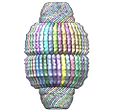Cyanobacterial morphology refers to the form or shape of cyanobacteria. Cyanobacteria are a large and diverse phylum of bacteria defined by their unique...
69 KB (6,986 words) - 15:14, 22 August 2024
Cyanobacteria (redirect from Cyanobacterial)
such as microcystins, saxitoxin, and cylindrospermopsin. Nowadays, cyanobacterial blooms pose a serious threat to aquatic environments and public health...
180 KB (17,735 words) - 17:20, 13 November 2024
different lichen forms when associating with either a green algal or a cyanobacterial symbiont. Quite naturally, these alternative forms were at first considered...
5 KB (567 words) - 13:22, 18 July 2023
Stromatolite (section Morphology)
create their food. A layer of polysaccharides often forms over mats of cyanobacterial cells. In modern microbial mats, debris from the surrounding habitat...
40 KB (3,940 words) - 11:14, 17 November 2024
Aphanothece (section Morphology)
Jezberová, Jitka (2011). "Phylogenetic and taxonomic delimitation of the cyanobacterial genus Aphanothece and description of Anathece gen. nov ". European Journal...
8 KB (880 words) - 18:34, 16 August 2024
helical shape of Helicobacter pylori. Biology portal Cell division Cyanobacterial morphology Cytokinesis Cytoskeleton Prokaryotes Protein filament Gitai Z...
21 KB (2,508 words) - 01:13, 23 July 2024
Diatom (redirect from Diatom morphology)
metabolic ends in diatoms. The family Rhopalodiaceae also possess a cyanobacterial endosymbiont called a spheroid body. This endosymbiont has lost its...
148 KB (15,312 words) - 18:17, 21 November 2024
Lichen (section Anatomy and morphology)
be dense or loose. Generally, the fungal mesh surrounds the algal or cyanobacterial cells, often enclosing them within complex fungal tissues that are unique...
132 KB (14,357 words) - 17:33, 11 November 2024
Gloeotrichia (section Morphology)
to outcompete other phytoplankton and thrive in low-N environments. Cyanobacterial N-fixation also impacts overall phytoplankton community structure by...
12 KB (1,395 words) - 03:06, 5 June 2024
Bacteria (redirect from Bacteria morphology)
when nutrients become available, such as the formation of algal and cyanobacterial blooms that often occur in lakes during the summer. Other organisms...
143 KB (15,534 words) - 20:00, 8 November 2024
Anabaena circinalis (section Morphology)
having evolved from a cyanobacterial ancestor approximately 1-2 billion years ago. Because PST-producing A. circinalis is morphologically similar to non-PST...
12 KB (1,357 words) - 00:43, 5 October 2023
Aphanizomenon flos-aquae (section Morphology)
persists as akinetes deep in the layers of sediment. These dormant cyanobacterial cells will last all season until the water temperature rises again in...
16 KB (1,760 words) - 18:42, 13 November 2024
Cyanophage (section Morphology)
are key regulators of the cyanobacterial populations in aquatic environments, and may aid in the prevention of cyanobacterial blooms in freshwater and...
36 KB (4,106 words) - 08:12, 19 August 2024
Gunnera (section Cyanobacterial symbiosis)
; Wanntorp, L.; Pfeifer, E. (2004). "Gunnera herteri — developmental morphology of a dwarf from Uruguay and S Brazil (Gunneraceae)". Plant Systematics...
27 KB (2,357 words) - 23:01, 29 July 2024
mat on tree trunks, with a complex structure consisting of blue-green cyanobacterial filaments wrapped in a network of fungal hyphae. Its defining feature...
6 KB (655 words) - 09:09, 12 August 2023
Archaeplastida (section Morphology)
accumulated inside the chloroplasts. The glaucophytes have typical cyanobacterial pigments, but their plastids (called cyanelles) differ in having a peptidoglycan...
42 KB (4,163 words) - 13:26, 7 September 2024
Johansen JR (2014). "Taxonomic classification of cyanoprokaryotes (cyanobacterial genera) 2014, using a polyphasic approach" (PDF). Preslia. 86: 295–335...
4 KB (327 words) - 16:49, 26 October 2023
commercial interest. In: Cresswell RC, Rees TAV, Shah, N, editor. Algal and Cyanobacterial Biotechnology. Harlow: Longman Scientific and Technical Press; 1989...
12 KB (1,417 words) - 10:09, 10 November 2024
Botany (section Plant anatomy and morphology)
endosymbiotic relationship between an ancestral eukaryotic cell and a cyanobacterial resident. The algae are a polyphyletic group and are placed in various...
138 KB (14,773 words) - 09:08, 30 October 2024
Trichodesmium erythraeum (section Morphology)
remains one of the larger cyanobacterial genomes currently sequenced, at around 7.75 Mbp in length. Among 58 cyanobacterial genomes, phylogenetic analysis...
21 KB (2,313 words) - 08:25, 10 October 2024
chloroplasts and rhodoplasts—is still surrounded by the remains of the cyanobacterial cell wall. All these primary plastids are surrounded by two membranes...
29 KB (3,219 words) - 10:04, 11 October 2024
period of dehydration requires several minutes at least. The algal or cyanobacterial cells are photosynthetic, and as in plants they reduce atmospheric carbon...
13 KB (1,577 words) - 08:30, 25 July 2024
Freshwater bivalve (section Morphology)
animal populations and are also known for causing benthic algae and cyanobacterial blooms. The total impact of dreissenids on freshwater ecosystems is...
23 KB (2,681 words) - 08:26, 15 August 2024
consists of numerous, periclinally arranged, parallel fibrils formed by cyanobacterial filaments wrapped in a closed hyphal sheath of jigsaw-puzzle-shaped...
6 KB (671 words) - 10:52, 10 October 2024
Stromatoporoidea (section Morphology)
Bloc specialists continued to regard stromatoporoids as cnidarians or cyanobacterial accumulations akin to stromatolites or thrombolites. The first unambiguous...
46 KB (4,843 words) - 19:03, 15 August 2024
Honegger, R.; Rothwell, G. W. (2008). "Earliest fossil record of bacterial–cyanobacterial mat consortia: the early Silurian Passage Creek biota (440 Ma, Virginia...
140 KB (17,348 words) - 23:49, 15 November 2024
following the discovery of the precursor lipids, 2-methylhopanols, in cyanobacterial cultures and mats. The subsequent discovery of 2-α-methylhopanes supposedly...
42 KB (4,594 words) - 15:54, 23 June 2024
Li-Yaung (2018-07-02). "Fern genomes elucidate land plant evolution and cyanobacterial symbioses". Nature Plants. 4 (7): 460–472. doi:10.1038/s41477-018-0188-8...
9 KB (829 words) - 22:41, 28 October 2024
associated with large populations of Synechococcus and elevated form IA (cyanobacterial) rbcL mRNA. Prochlorococcus is thought to be at least 100 times more...
30 KB (3,294 words) - 05:56, 12 August 2024
Vault (organelle) (section Morphology)
the major vault protein has been computationally found in bacteria. Cyanobacterial sequences appear most similar. Pfam is also able to identify some such...
16 KB (1,880 words) - 03:03, 25 September 2024


























